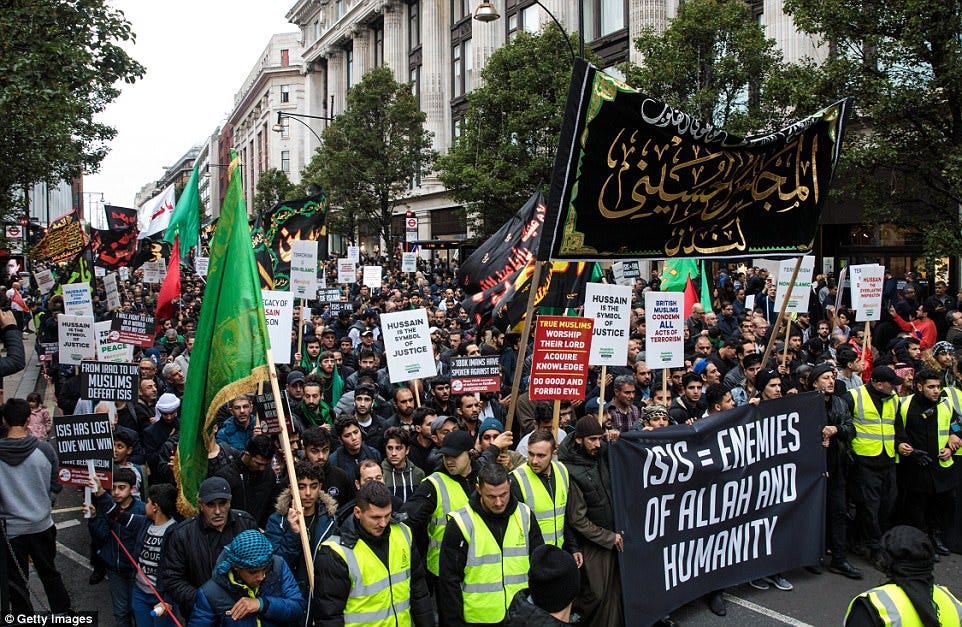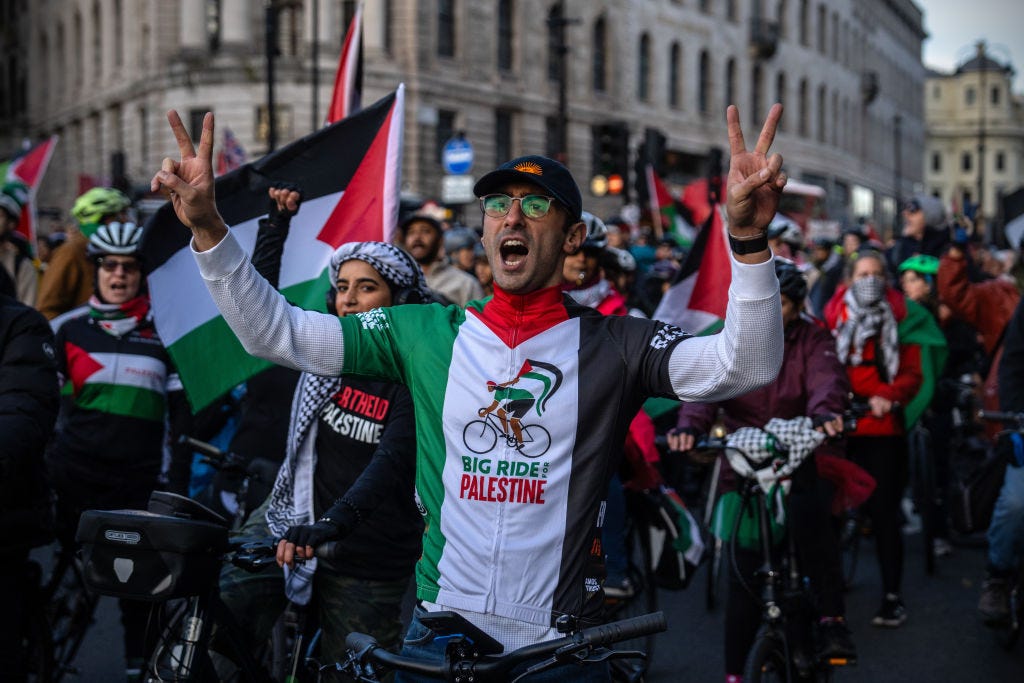The Growing Sectarianism of British Politics
Thursday's local elections provided the clearest sign yet that British society is fragmenting along religious and ethnic divisions, threatening to undermine national unity.
When Blairite technocrats first swung open the country’s borders to mass immigration in the late 1990s, they did so under the assumption that the new influx of citizens from different cultures and backgrounds would usher in a new age of enlightenment, enriching the country’s demographics and society through new cusines, customs and, most importantly, outlooks on life. The selling-point was a post-national state still keeping true to its history but augmented with cultures originating from the third-world.
Thirty years later, it’s safe to conclude that the dream of a religiously-tolerant and ethnically vibrant society is no closer to fruition than it was when Tony Blair first stepped through the doors of 10 Downing Street in May 1997. In fact, with so many new-generation immigrants taking up residence following the post-Covid immigration wave and the internet acting as a conduit for inflammatory rhetoric, the situation now can safely be declared as an even more tenuous position than at any point in this nation’s history.
As I have written extensively in the past, large swathes of Britain’s newly imported citizens remain animated by issues plaguing their homeland rather than their adopted nation. Indian diaspora launch large-scale street rallies in support of Prime Minister Modi’s saber-rattling provocations over the province of Kashmir. Tens of thousands of Muslims march in the streets calling for an intifada against Israel while hurling antisemitic remarks as they enter predominantly Jewish areas. Some were content to cry “Allahu akbar!” and chant for a “jihad,” a term that the police are eager to explain might sometimes mean a peaceful inner struggle. Some shouted “from the river to the sea, Palestine will be free,” a genocidal demand to destroy the state of Israel and cleanse the territory of its Jews.
What looked to be isolated to mere street demonstrations now seems to be bleeding into electoral politics, with tangible results being felt in urban areas across the country. In the West Midlands mayoral election, Akhmed Yakoob, an independent candidate who centered his campaign around the issue of Gaza, emerged in third place, winning nearly 12% of the vote share, translating to around 70,000 votes. Unsurprisingly, most of Yakoob’s votes came from the Muslim dominated regions of Birmingham, one of Labour’s key demographic voting blocs that have begun drifting away from the party over disillusionment with Keir Starmer’s stance towards Palestine, an approach many consider too lenient on Israel. In a similar vein, four candidates from George Galloway’s new Britain’s Workers Party won election in, again, Muslim-dominated wards in northern cities thanks to their ardent support for Palestine and subtle overtures to socially-conservative voters through opposition to LGBT couples.
There is also growing speculation that a new Islamic party, orientated around Islamic-related issues, may attempt to field candidates in Muslim-dominant constituencies after registering as a party in early October 2023.
And this is just what is manifesting in public. We now know the truth about the systematic sexual abuse suffered by vulnerable white girls in northern post-industrial towns at the hands of mainly Muslim men, inculcated with a belief that these dehumanised “kuffar” were worthless. We know about the Batley school teacher who, two and a half years on, remains in hiding with his family after he showed pupils a depiction of the Prophet Mohammed. We know about the show trial, held in a mosque with the police participating, when a Wakefield schoolboy was accused of desecrating a Koran. In all these cases, state organisations themselves were complicit in criminality, threats and violence.
The desire to play things down, to convince ourselves that this is all about a quarrel in a far away country, might be understandable, but it is profoundly wrong. The people chanting this hatred are almost certainly British nationals, some of them second or third generation immigrants who have known no country other than the UK. It would be naive to suggest that all of them are recent immigrants still at ease with their new home and taking time to settle down. And they are doing so in such huge numbers that the police have opted not to enforce the law for fear of wider public disorder. While some of the hatred is targeted at Jews, it is also meant for the rest of us, epitomising the disdain many feel towards Western society and culture.
Once, when terrorism struck here in the UK, we had anguished debates about these problems. More recently, however, we have become inured, as everything quickly moves on. When Sir David Amess was killed by an Islamist, MPs chose to discuss abuse on social media rather than the extremist ideology that might have impelled his murderer. Everything from the staking of politicians’ homes and families to hounding them on the streets is either waved away or minimalized. When attacks occur, we are always told to wait until a conviction to debate the motive. Predictably, that debate never comes.
Meanwhile, radical Islamist organisations, often set up and funded by foreign governments, have learned to exploit the absurdities of our modern politics. They operate the mechanics of our identity corporatism and competitive victimhood with finesse. The Crown Prosecution Service, which helped to decide not to prosecute those chanting “jihad” last week, is advised on hate crime by the chair of Finsbury Park Mosque, who has praised Hamas as “martyrs of the resistance”. From the military to the prison service, the public sector is inundated with such examples.
This extremism, and the radical diversity of our society, brimming with ethnic tensions and imported hatreds, means the assumptions that informed traditional British policy – pragmatism, moderation – no longer hold. The diminished commitment to shared norms and our weaker common identity means there is less social trust to sustain our freedoms in the conventional way. The sooner we realise this, the less painful will be the changes we face.
Broadly speaking, we need a more muscular approach to end this culture of domestic separatism: in immigration, law enforcement, and public policy across the board. The jurisdiction of the police and CPS should be expanded to uphold the law, but the law should be tightened to clamp down on incitement, hate speech and extremism. There should be a register of imams and mosques, with unacceptable behaviour leading to preaching bans, investigations and, if found guilty, closures.
TV channels that disseminate hatred must be terminated. Charities that espouse extremist beliefs should be closed down. Foreigners who spread harmful, divisive Islamist ideology should be deported. The burqa should be banned in public places, and the hijab banned for school children. Islamic supplementary schools should be regulated properly. The dual jurisdiction of our national law and sharia law must end, with sharia marriages criminalised. Public funding for mosques and Islamic centres must cease.
This is by no means an extensive list, but it offers a guide on how our society should regulate this burgeoning harmful culture. Continuing to prostrate, to submit to the demands of these fanatics, as our political elite has done for the last few decades, will only strengthen their resolve and dilute the fabric of our nation, corrupting it to something unrecognizable.
Some may claim this amounts to discriminating against the Islamic faith or other cultures, but the problem we face emanates from the third-world backwardness politicians have imported. Nothing will change until we tell ourselves the truth – and start to act accordingly.



